外研版英语七年级下Module 11 Body languageUnit 3 Language in use课件(48张PPT无素材)
文档属性
| 名称 | 外研版英语七年级下Module 11 Body languageUnit 3 Language in use课件(48张PPT无素材) | 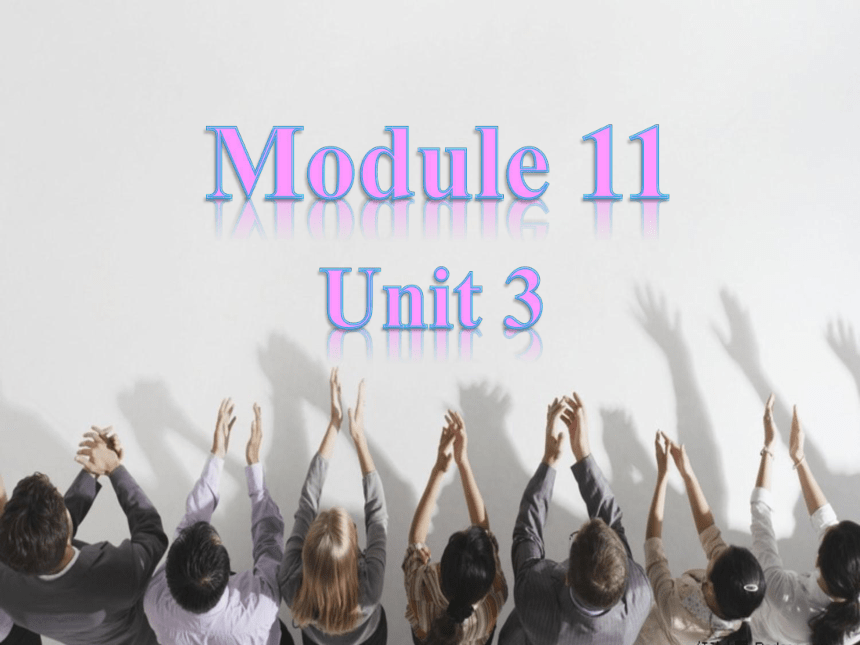 | |
| 格式 | zip | ||
| 文件大小 | 7.8MB | ||
| 资源类型 | 教案 | ||
| 版本资源 | 外研版 | ||
| 科目 | 英语 | ||
| 更新时间 | 2020-04-27 22:32:55 | ||
图片预览




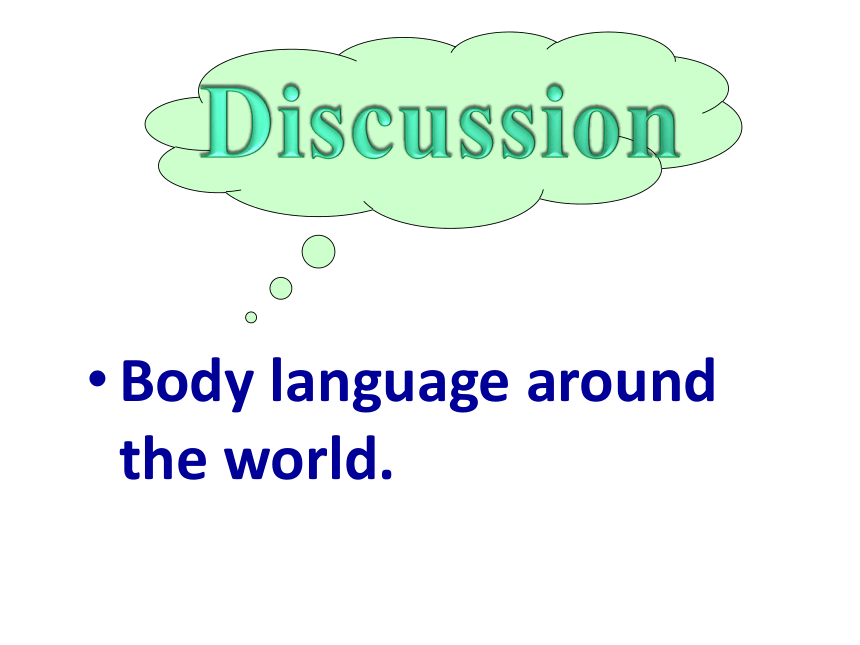



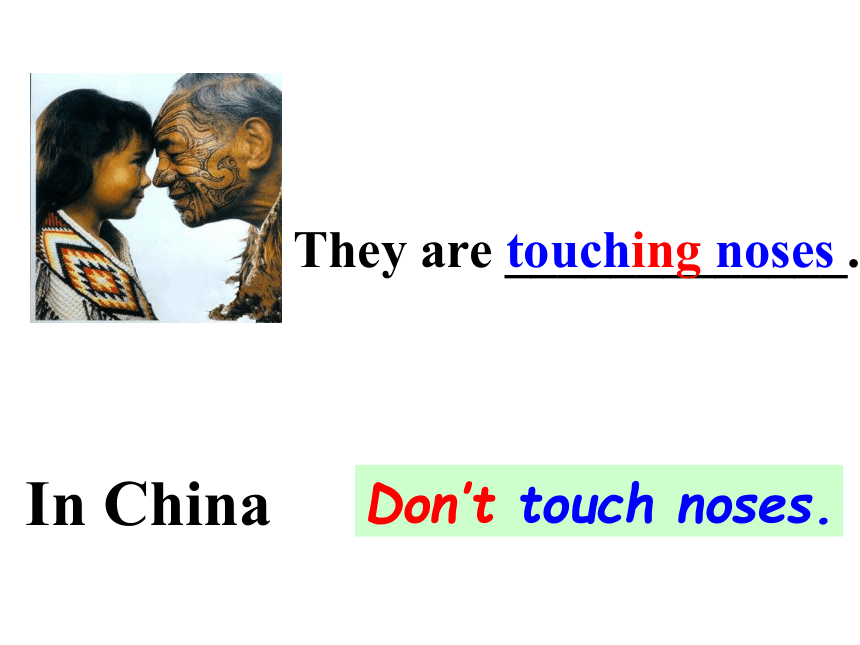

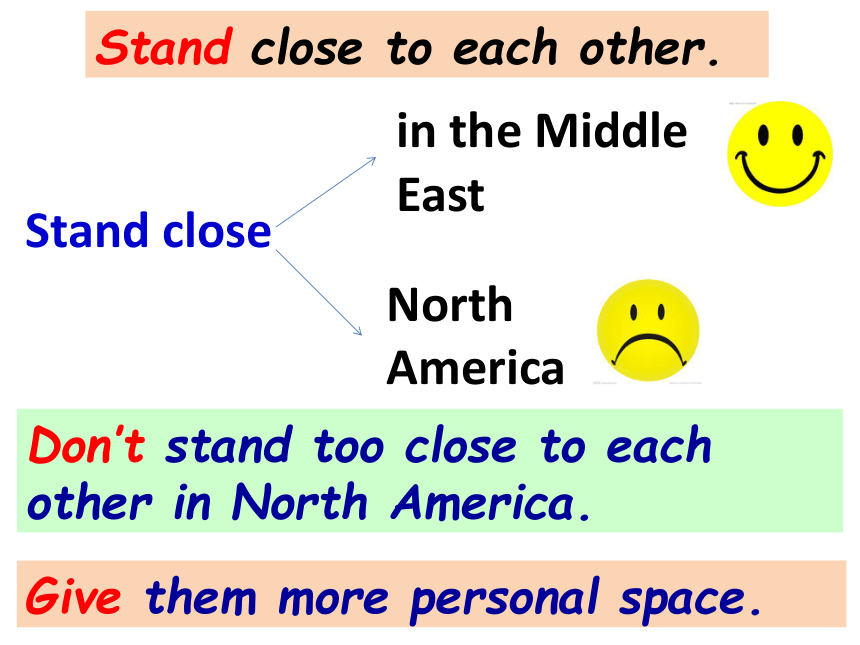
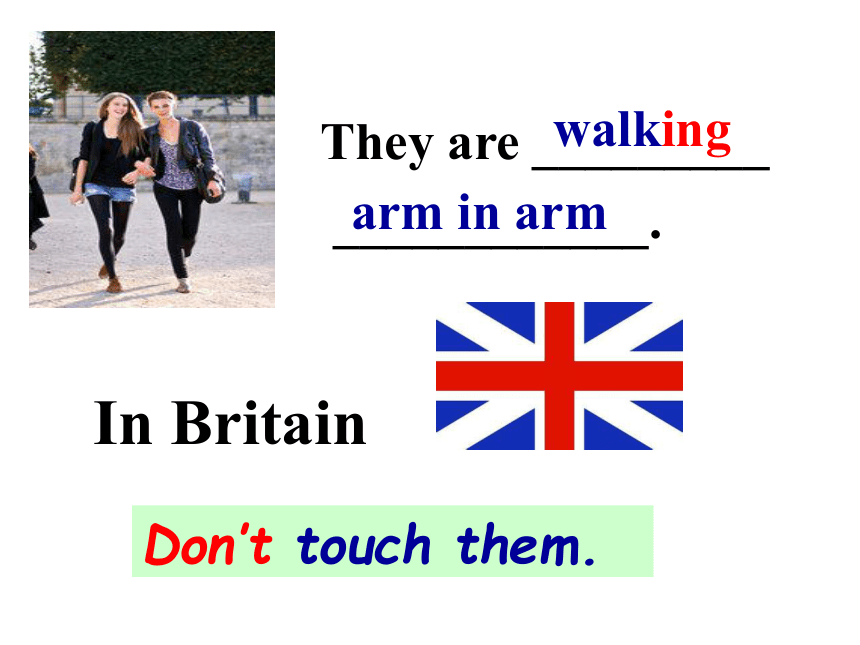
文档简介
(共53张PPT)
OK
Victory!
Be quiet!
Stop!
Well done!
Hello!
Look and say
People from different countries have different body language.
different ways
of greetings
Brainstorm
Body language around the world.
Shake hands and smile.
Nod their heads.
Ways of greeting
What do Chinese do when they meet each other?
They are _______ and ________.
In China
Don’t kiss when you meet Chinese.
Ways of greeting
smiling
kissing
She is ____________
_________.
putting hands
In China
together
Ways of greeting
Don’t put hands together and nod head.
They are _____________.
touching noses
In China
Don’t touch noses.
Shake hands.
Smile.
Nod heads.
Don’t kiss.
Don’t put hands together and nod head.
Don’t touch noses.
Ways of greeting in China
Do’s Don’ts
Stand close
in the Middle East
North America
Don’t stand too close to each other in North America.
Give them more personal space.
Stand close to each other.
They are _________
____________.
In Britain
Don’t touch them.
walking
arm in arm
They are _______ and
___________________.
talking
looking at each other
In Britain
Look at people when you talk to them.
Wave to say goodbye
It isn’t _____ to wave to say goodbye.
polite
In Greece
Don’t wave to say goodbye in Greece.
rude
√Give them more personal space.
√Look at each other when you talk.
Don’t stand too close to them.
Don’t touch them.
Don’t wave to say goodbye.
The list for us.
Do’s Don’ts
North America
Britain
Greece
1. ______ them more personal space.
2. ______ to say goodbye.
3. _____ careful!
4. ______ ______ too close to North Americans.
5. _____ polite to the teacher.
6. ______ ______ the British at all!
Give
Wave
Be
Don’t stand
Be
Fill in the blanks.
Don’t touch
Suggestions
7. _____ _____ each other when you talk in Britain and the US.
8. ______ _____ when you answer a question in class.
9. ______ _____ late for class.
10. ______ _____ food in class.
Look at
Stand up
Don’t be
Don’t eat
Imperative sentences
(祈使句)
用于表达命令、请求、劝告、警告、禁止等的句子。
祈使句的主语通常为第二人称 you,且常省略。一般没有时态和语态的变化,句末用句号或感叹号,
Stand up, please! 请起立!
Be quiet, children! 孩子们,请安静!
Let me have a look. 让我看一看。
祈使句的基本结构
肯定形式:常以动词原形开头。
(谓语)动词原形+其它成分.
Don’t be late next time!
下次别迟到!
Don’t take it with you!
不要把它带走。
Don’t let her go there.
不要让她去那里。
Never do it like that.
再也不要那样做了。
否定形式: 常在肯定式前加Don’t,
也可加Never。
由Let引导的句子多是祈使句,即:
“Let+宾语+动词原形+其他” Let sb do sth
→否定形式:
“Don’t+let+宾语+动词原形 +其它”
Don’t let sb do sth
或“Let+宾语+not+动词原形+其他”
Let sb not do sth
不要让他去那里。
Let him not go there.
Don’t let him go there.
1. 为使语气委婉,通常将祈使句与please连用。
Please open the door.
2. 有时为了指明向谁提出请求或命令,可以加
称呼语。
Tony, please sit down.
3. 祈使句在口语中还可以用到以下几种形式:
Help! No photos/parking!
Hands up!
Open the door, please. /
口 诀
祈使句,有特点,
动词原形摆在前,
否定句式也不难,
Don’t 放在最前面,
其它一律都不变。
1. Can you open the door, Steven? (改为祈使句)
______ ____ _____, Steven.
2. Stand in line. (改为否定句)
_____ ______ in line.
3. You must be careful, Susan. (改为祈使句)
____ ________, Susan.
4. You shouldn’t be late for school, Linda!
(改为否定祈使句)
_______ ____ late for school, Linda.
Open the door
Don’t stand
Be careful
Don’t be
按要求转换句型,每空一词。
Talk about do’s and don’ts in a foreign country.
◆ Stand in line.
Don’t touch people.
Do’s Don’ts
Britain ◆ Stand in line.
◆ Shake hands.
◆ Say “please” and “thank you”.
◆ Open doors for others.
◆ Look at people when you talk.
◆ Be on time.
● Touch people.
● Ask a woman’s age.
● Stand too close.
● Say anything too personal.
Shake hands when you meet a friend.
Stand in line.
Expect rain.
Please talk about the weather.
Say “please” and “thank you”.
Look at people when you talk.
Don’t touch people.
Don’t ask people personal questions.
Don’t ask a woman’s age.
Don’t talk with food in your mouth.
Don’t be late.
It’s important to listen to the teacher.
Listen to the teacher.
You cannot shout in the classroom.
Don’t shout in the classroom.
Rewrite the sentences. (P 70)
It’s important to be careful.
Be careful.
2. It’s important to clean and tidy the lab.
Clean and tidy the lab.
3. You cannot touch anything if the teacher doesn’t ask you to.
Don’t touch anything if the teacher doesn’t ask you to.
4. You cannot bring food or drink into the lab.
Don’t bring food or drink into the lab.
5. You cannot enter the lab alone.
Don’t enter the lab alone.
In daily life
Be careful!
Care slip !
Care electricity !
Care steam!
Take care your
children!
Watch your step!
No swimming!
No smoking!
No parking!
No photos!
Don’t drink!
Don’t touch!
No climbing!
Be/Keep quiet!
No entering!
Turn right.
Turn around.
Turn left.
What can we do at school?
What can’t we do at school?
A: Can we be late for class?
B: No, We can’t be late for class.
Don’t be late for class.
Our class rules.
A: Shall we stand up
when we answer a
question in class?
B: Yes, we shall.
Stand up when you answer
a question in class.
Our class rules.
Don’t eat in class.
A: Can we eat in class?
B: No, We can’t eat in class.
Our class rules.
_____ in the dinning hall, please!
Eat
A: Can we run in the hallways?
B: No, we can’t.
Don’t run in the hallways.
A: Can you fight?
B: No, we can’t.
______ fight.
Don’t
A: Can we play basketball in the classroom?
B: No, we can’t. But we can play it outside.
Don’t play basketball in the classroom.
Play basketball outside.
Don’t listen to the
music in class.
Don’t sleep in class.
Don’t bring the mobile
phone to the school.
friendly
polite
1. Don’t be late for class.
2. Don’t run in the classroom.
3. Don’t eat in class.
4. Don’t listen to music in class.
5. Don’t fight.
6. Listen to the teacher carefully.
7. Be polite to the teacher.
8. Be friendly to classmates.
…
Class rules
Make a list of your family rules.
…
…
Don’t sleep too late on Sunday.
Don’t watch TV late at night.
Don’t eat in bed.
Clean the bedroom on Saturday.
Don’t talk loudly at home.
Don’t play the guitar late at night.
Go to bed before 9 o’clock.
Don’t waste (浪费)water.
Don’t read in bed.
Make the bed every day.
Wash your hands before meals.
Turn off the lights before you leave the room.
Don’t read or eat at the same time.
Don’t talk loudly on the phone.
Be polite to the visitors.
Make a list of your family rules.
Don’t talk loudly at home
Don’t watch TV late at night.
Don’t eat or read in bed.
Don’t play the guitar late at night.
Don’t sleep too late on Sunday.
Go to bed before 9 o’clock.
Clean the bedroom on Saturday/ at the weekend.
Make the bed every day.
Wash your hands before meals.
Turn off the lights before you leave the room.
Don’t read or eat at the same time.
Don’t waste (浪费)water. / Save water.
Be polite to the visitors.
Don’t open the door for strangers.
Help with the housework
Imperative sentences
(祈使句)
Different body language in different countries.
Our class rules.
What can you learn from this lesson?
A smile is the most beautiful language
in the world! 微笑是世上最美的语言。
OK
Victory!
Be quiet!
Stop!
Well done!
Hello!
Look and say
People from different countries have different body language.
different ways
of greetings
Brainstorm
Body language around the world.
Shake hands and smile.
Nod their heads.
Ways of greeting
What do Chinese do when they meet each other?
They are _______ and ________.
In China
Don’t kiss when you meet Chinese.
Ways of greeting
smiling
kissing
She is ____________
_________.
putting hands
In China
together
Ways of greeting
Don’t put hands together and nod head.
They are _____________.
touching noses
In China
Don’t touch noses.
Shake hands.
Smile.
Nod heads.
Don’t kiss.
Don’t put hands together and nod head.
Don’t touch noses.
Ways of greeting in China
Do’s Don’ts
Stand close
in the Middle East
North America
Don’t stand too close to each other in North America.
Give them more personal space.
Stand close to each other.
They are _________
____________.
In Britain
Don’t touch them.
walking
arm in arm
They are _______ and
___________________.
talking
looking at each other
In Britain
Look at people when you talk to them.
Wave to say goodbye
It isn’t _____ to wave to say goodbye.
polite
In Greece
Don’t wave to say goodbye in Greece.
rude
√Give them more personal space.
√Look at each other when you talk.
Don’t stand too close to them.
Don’t touch them.
Don’t wave to say goodbye.
The list for us.
Do’s Don’ts
North America
Britain
Greece
1. ______ them more personal space.
2. ______ to say goodbye.
3. _____ careful!
4. ______ ______ too close to North Americans.
5. _____ polite to the teacher.
6. ______ ______ the British at all!
Give
Wave
Be
Don’t stand
Be
Fill in the blanks.
Don’t touch
Suggestions
7. _____ _____ each other when you talk in Britain and the US.
8. ______ _____ when you answer a question in class.
9. ______ _____ late for class.
10. ______ _____ food in class.
Look at
Stand up
Don’t be
Don’t eat
Imperative sentences
(祈使句)
用于表达命令、请求、劝告、警告、禁止等的句子。
祈使句的主语通常为第二人称 you,且常省略。一般没有时态和语态的变化,句末用句号或感叹号,
Stand up, please! 请起立!
Be quiet, children! 孩子们,请安静!
Let me have a look. 让我看一看。
祈使句的基本结构
肯定形式:常以动词原形开头。
(谓语)动词原形+其它成分.
Don’t be late next time!
下次别迟到!
Don’t take it with you!
不要把它带走。
Don’t let her go there.
不要让她去那里。
Never do it like that.
再也不要那样做了。
否定形式: 常在肯定式前加Don’t,
也可加Never。
由Let引导的句子多是祈使句,即:
“Let+宾语+动词原形+其他” Let sb do sth
→否定形式:
“Don’t+let+宾语+动词原形 +其它”
Don’t let sb do sth
或“Let+宾语+not+动词原形+其他”
Let sb not do sth
不要让他去那里。
Let him not go there.
Don’t let him go there.
1. 为使语气委婉,通常将祈使句与please连用。
Please open the door.
2. 有时为了指明向谁提出请求或命令,可以加
称呼语。
Tony, please sit down.
3. 祈使句在口语中还可以用到以下几种形式:
Help! No photos/parking!
Hands up!
Open the door, please. /
口 诀
祈使句,有特点,
动词原形摆在前,
否定句式也不难,
Don’t 放在最前面,
其它一律都不变。
1. Can you open the door, Steven? (改为祈使句)
______ ____ _____, Steven.
2. Stand in line. (改为否定句)
_____ ______ in line.
3. You must be careful, Susan. (改为祈使句)
____ ________, Susan.
4. You shouldn’t be late for school, Linda!
(改为否定祈使句)
_______ ____ late for school, Linda.
Open the door
Don’t stand
Be careful
Don’t be
按要求转换句型,每空一词。
Talk about do’s and don’ts in a foreign country.
◆ Stand in line.
Don’t touch people.
Do’s Don’ts
Britain ◆ Stand in line.
◆ Shake hands.
◆ Say “please” and “thank you”.
◆ Open doors for others.
◆ Look at people when you talk.
◆ Be on time.
● Touch people.
● Ask a woman’s age.
● Stand too close.
● Say anything too personal.
Shake hands when you meet a friend.
Stand in line.
Expect rain.
Please talk about the weather.
Say “please” and “thank you”.
Look at people when you talk.
Don’t touch people.
Don’t ask people personal questions.
Don’t ask a woman’s age.
Don’t talk with food in your mouth.
Don’t be late.
It’s important to listen to the teacher.
Listen to the teacher.
You cannot shout in the classroom.
Don’t shout in the classroom.
Rewrite the sentences. (P 70)
It’s important to be careful.
Be careful.
2. It’s important to clean and tidy the lab.
Clean and tidy the lab.
3. You cannot touch anything if the teacher doesn’t ask you to.
Don’t touch anything if the teacher doesn’t ask you to.
4. You cannot bring food or drink into the lab.
Don’t bring food or drink into the lab.
5. You cannot enter the lab alone.
Don’t enter the lab alone.
In daily life
Be careful!
Care slip !
Care electricity !
Care steam!
Take care your
children!
Watch your step!
No swimming!
No smoking!
No parking!
No photos!
Don’t drink!
Don’t touch!
No climbing!
Be/Keep quiet!
No entering!
Turn right.
Turn around.
Turn left.
What can we do at school?
What can’t we do at school?
A: Can we be late for class?
B: No, We can’t be late for class.
Don’t be late for class.
Our class rules.
A: Shall we stand up
when we answer a
question in class?
B: Yes, we shall.
Stand up when you answer
a question in class.
Our class rules.
Don’t eat in class.
A: Can we eat in class?
B: No, We can’t eat in class.
Our class rules.
_____ in the dinning hall, please!
Eat
A: Can we run in the hallways?
B: No, we can’t.
Don’t run in the hallways.
A: Can you fight?
B: No, we can’t.
______ fight.
Don’t
A: Can we play basketball in the classroom?
B: No, we can’t. But we can play it outside.
Don’t play basketball in the classroom.
Play basketball outside.
Don’t listen to the
music in class.
Don’t sleep in class.
Don’t bring the mobile
phone to the school.
friendly
polite
1. Don’t be late for class.
2. Don’t run in the classroom.
3. Don’t eat in class.
4. Don’t listen to music in class.
5. Don’t fight.
6. Listen to the teacher carefully.
7. Be polite to the teacher.
8. Be friendly to classmates.
…
Class rules
Make a list of your family rules.
…
…
Don’t sleep too late on Sunday.
Don’t watch TV late at night.
Don’t eat in bed.
Clean the bedroom on Saturday.
Don’t talk loudly at home.
Don’t play the guitar late at night.
Go to bed before 9 o’clock.
Don’t waste (浪费)water.
Don’t read in bed.
Make the bed every day.
Wash your hands before meals.
Turn off the lights before you leave the room.
Don’t read or eat at the same time.
Don’t talk loudly on the phone.
Be polite to the visitors.
Make a list of your family rules.
Don’t talk loudly at home
Don’t watch TV late at night.
Don’t eat or read in bed.
Don’t play the guitar late at night.
Don’t sleep too late on Sunday.
Go to bed before 9 o’clock.
Clean the bedroom on Saturday/ at the weekend.
Make the bed every day.
Wash your hands before meals.
Turn off the lights before you leave the room.
Don’t read or eat at the same time.
Don’t waste (浪费)water. / Save water.
Be polite to the visitors.
Don’t open the door for strangers.
Help with the housework
Imperative sentences
(祈使句)
Different body language in different countries.
Our class rules.
What can you learn from this lesson?
A smile is the most beautiful language
in the world! 微笑是世上最美的语言。
同课章节目录
- Module 1 Lost and found
- Unit 1 Whose bag is this?
- Unit 2 Are they yours?
- Unit 3 Language in use
- Module 2 What can you do ?
- Unit 1 I can play the piano
- Unit 2 I can run really fast
- Unit 3 Language in use
- Module 3 Making plans
- Unit 1 What are you going to do at the weekends?
- Unit 2 We're going to cheer the players.
- Unit 3 Language in use
- Module 4 Life in the future
- Unit 1 Everyone will study at home
- Unit 2 Every family will have a small plane.
- Unit 3 Language in use
- Module 5 Shopping
- Unit 1 What can I do for you?
- Unit 2 You can buy everything on the Internet
- Unit 3 Language in use
- Module 6 Around town
- Unit 1 Could you tell me how to get to the Nationa
- Unit 2 The London Eye is on your right.
- Unit 3 Language in use
- Revision module A
- Module 7 My past life
- Unit 1 I was born in a small village.
- Unit 2 I was born in Quincy.
- Unit 3 Language in use
- Module 8 Story time
- Unit 1 Once upon a time….
- Unit 2 Goldilocks hurried out of the house.
- Unit 3 Language in use
- Module 9 Life history
- Unit 1 He left school and began work at the age of
- Unit 2 He decided to be an actor.
- Unit 3 Language in use
- Module 10 A holiday journey
- Unit 1 What did you do?
- Unit 2 This morning we took a walk.
- Unit 3 Language in use
- Module 11 Body language
- Unit 1 They touch noses!
- Unit 2 Here are some ways to welcome them.
- Unit 3 Language in use
- Module 12 Western music
- Unit 1 It's so beautiful!
- Unit 2 Vienna is the centre of European classical
- Unit 3 Language in use
- Revision module B
